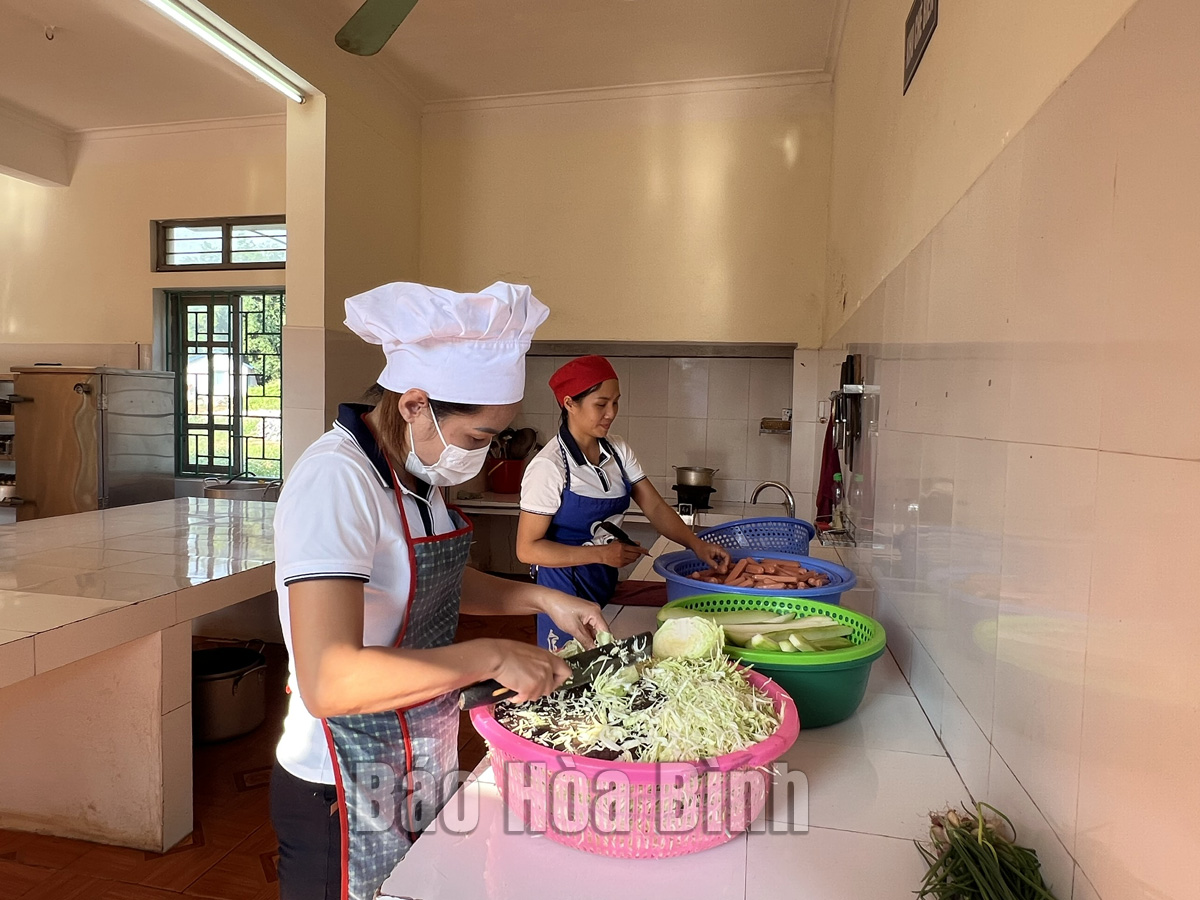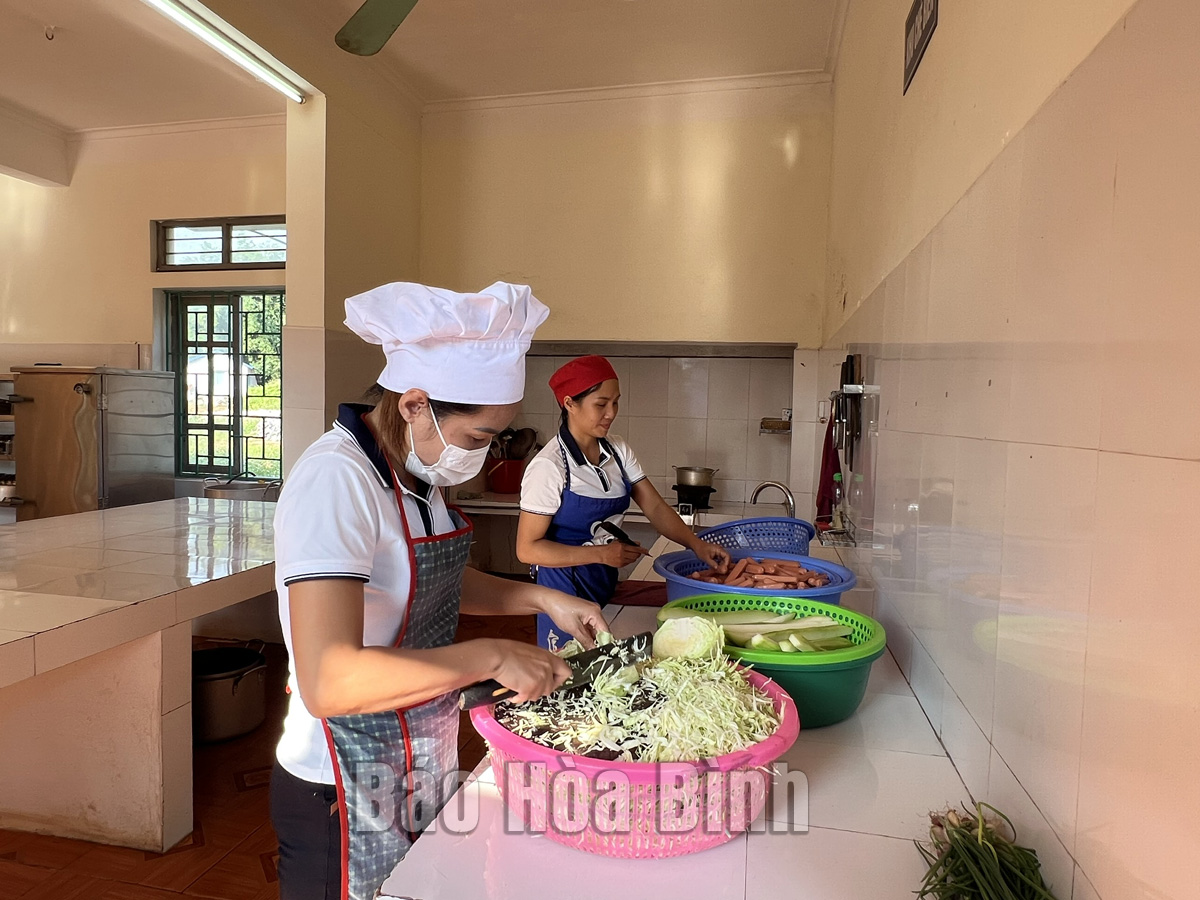
(HBO) - In 2018, Hoa Binh city was recognised as fulfilling new-style rural building criteria. However, after Ky Son district merged into the city in 2020, some communes had not yet met the standards of new-style rural areas so Hoa Binh has continued to implement the task.
As of May 30, the city has six out of seven communes that had
fulfilled new-style rural area building criteria. With high consensus,
determination and joint effort of the whole political system, Hoa Binh city is
trying to meet all the criteria and new-style rural building targets.
The
canteen of the Doc Lap Primary and Secondary Semi-boarding School for ethnic
minorities in Doc Lap commune (Hoa Binh city) meets the requirements of food
hygiene and safety.
Doc Lap, an upland commune with extreme difficulties, has six hamlets with 626
households and 2,948 people. Nguyen Ngoc Que, Chairman of the commune People's
Committee, said that this year the locality is striving to fulfill all 19
new-style rural building criteria. Along with speeding up the construction of
traffic works and cultural institutions, the commune has step up dissemination
and mobilised people to change the crop structure and expand agricultural
production models with high value as well as associating agricultural production
with the development of commerce, services and tourism, he said, adding that it
is striving to reduce the number of poor households to 11.48%in 2023.
Defining that restructuring the agricultural sector towards
increasing added value and sustainable development is the utmost goal and a
breakthrough factor in its socio-economic development, the city has
synchronously implemented measures to restructure agriculture to make it
suitable to the potential and advantages of each region.
Hoa Binh city has also carried out the One Commune One Product
(OCOP) programme in association with creating favourable conditions for
enterprises to invest in and create a linkage in the sale of agricultural
products in the locality. The city has 18 products that are rated as 3- and
4-star OCOP products.
Along with encouraging people to change the structure of crops
and livestock, communes have strived to upgrade cultural and sports facilities
at communes and villages as well as embellish cultural heritages associated
with rural tourism development.
Over the past three years, the city has built two cultural
houses with nearly 700 seats, ensuring they meet the demands relating to the
organisation of major events, festivals and meetings. Up to 22 cultural houses
have been constructed in communes, wards and hamlets in the period. The city
has continued to direct communes to focus on building and upgrading other 62
cultural houses so that all communes will soon complete the criteria for
cultural facilities.
Hoa Binh has mobilised nearly 565 trillion VND (24 million USD) from the State
budget and the contribution of businesses and people for the new-style rural
building programme. Up to now, six out of the seven communes in the city have
met criteria relating to transport. The quality of education, health care,
medical examination and treatment for local residents has been significantly
improved while social order and safety have been maintained.
Do Viet Trieu, Vice Chairman of the Hoa Binh City People's Committee, said that
despite achieving positive results, it is not easy to fulfill the new-style
rural building targets. He cited the fact that some communes were recognised as
meeting news-style rural building standards for the 2016-2020 period but failed
to satisfy the criteria for the 2021-2025 period.
There remained difficulties relating to adjustments in
accordance with regulations on the planning work, especially the merged
communes. Therefore, the municipal People's Committee requested the communes to
maintain the criteria that have been fulfilled and devise solutions to those
that haven’t been met in line with a specific roadmap, he said./.
The Standing Board of the Hoa Binh provincial Party Committee has agreed in principle on a proposal by the Standing Board of the Party Committee of Hoa Binh city to gather feedback on the city’s 1:2000 zoning plan, which forms part of its broader urban development strategy.
Hoa Binh province has made notable progress in public administration reform and digital government development, with the satisfaction index among citizens and businesses reaching over 84%, according to recent government evaluations.
Thanks to great efforts by local authorities in recent times, the governance and public administration performance of Mai Chau district has been significantly improved.
In the afternoon of June 6, the Party Committee, the People's Council, the People's Committee and the Fatherland Front of Lac Son district solemnly held a meeting to celebrate the 139th anniversary of the district's founding (1886–2025) and the 79th anniversary of the establishment of the district's Party Committee (1946–2025). There was the attendance of Mr. Bui Van Thang, the Vice Chairman of the Provincial People's Council; Mr. Quach Tat Liem, the Vice Chairman of the Provincial People's Committee; Ms. Dang Bich Ngoc, the Deputy Head of the National Assembly Delegation of the province; as well as the former leaders of the province and district through various periods, who are the natives of the district.
Implementing the Politburo’s Resolution No. 57-NQ/TW on breakthroughs in science – technology, innovation, and digital transformation is a golden opportunity for the northern mountainous province of Hoa Binh to renew growth model, improve competitive edge and shorten digital gap.
Resolution 57-NQ/TW, issued by the Politburo on December 22, 2024, identifies sci-tech, innovation, and digital transformation as strategic breakthroughs to build a developed and prosperous nation. In Hoa Binh province, this spirit is not just a slogan, it’s being put into action through concrete initiatives that form a "new development triangle”: digital citizenship, digital economy, and digital administration.



